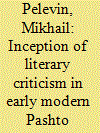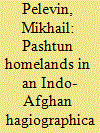| Srl | Item |
| 1 |
ID:
180034


|
|
|
|
|
| Summary/Abstract |
The article overviews the earliest Pashto texts, mostly poetic, in which the incipient forms of literary criticism can be traced as authorial self-reflections related in Persian classics to the self-praise genre (fakhriyya) and explanations of reasons for composing works (sabab-i taʾlīf). Under close examination are the seventeenth century verses of the poets affiliated with the Roshānī religious community and the writings of Khushḥāl Khān Khaṫak (d. 1689). Analyzed texts prove that through the rudimentary discourse on a variety of literary criticism topics, Pashtun authors of early modern times declared and justified the presence of emerging literature in Pashto within the Persophone cultural space of Mughal India, articulating simultaneously their commitment to the proliferation of literacy and Islamic book culture among their countrymen.
|
|
|
|
|
|
|
|
|
|
|
|
|
|
|
|
| 2 |
ID:
193602


|
|
|
|
|
| Summary/Abstract |
The article explores the ethnocultural aspects and ideological implications of a hagiographical collection from the Tārīkh-i Khānjahānī wa Makhzan-i Afghānī (1613), a book on the general history of the Pashtuns compiled in the Indo-Afghan diaspora. This article primarily focuses on the stories that either presumably originate from or directly relate in content to Pashtun tribal areas to the west of the Indus. Being foremost a supplement to the Tārīkh-i Khānjahānī’s genealogical section, the hagiographical anthology was included in this book to highlight and illustrate the idea of the Pashtuns’ continuous adherence to Islam throughout many centuries. However, its narratives suggest that Islamic traditions in the Pashtuns’ collective memory can be traced back as far as the turn of the thirteenth century. While the genealogies maintained the principle of patrilineal descent as the basic attribute of Pashtun identity, the hagiographies affirmed the profession of Islamic faith as another integral component of this identity and also brought to light its linguistic criterion. One of the article’s sections offers a survey of the cases where the Pashto language as well as Pashto lexemes and phrases are mentioned in the Persian text of the hagiographies. The article also attempts to locate the Tārīkh-i Khānjahānī’s hagiographical collection among similar works in Indo-Persian literature; it also considers such still-understudied issues as the emergence of spiritual lineages in Pashtun tribes and the entwining of folklore and conventional Islamic elements in the stories about Pashtun religious leaders.
|
|
|
|
|
|
|
|
|
|
|
|
|
|
|
|
| 3 |
ID:
190221


|
|
|
|
|
| Summary/Abstract |
Available essays on Pashtunwali describe this system of customary laws and ethics for the most part as a static model of ideal conduct, without a diachronic perspective. Offering a historical approach to Pashtunwali, this article introduces and analyzes fragmentary data on the nənawāte custom from early modern Pashto sources—historiographical narratives of the Khatak chieftains in the Tarikh-i Murassaʿ (finished 1724) and the romantic poem Adam Khan aw Durkhaney (1706/7). Recorded cases of resorting to nənawāte, considered among the main pillars of Pashtunwali but still variously interpreted, prove that this is a complex legal custom based on the right to appeal for protection, mediation, and reconciliation. As a common means of dispute settlement, nənawāte originates with a binding request for help and favor in a conflict situation. The discussion of nənawāte is preceded by a brief overview of the existing scholarly definitions of Pashtunwali, underscoring its emic perception as an ethnic identity marker.
|
|
|
|
|
|
|
|
|
|
|
|
|
|
|
|